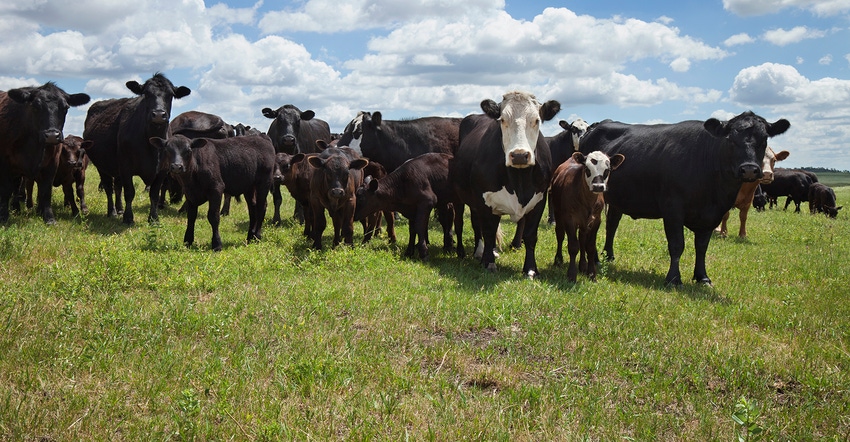Cattle Market Transparency Act introduced in Senate
Bill implements USDA's recommendations, establishes regional negotiated cash minimums and equips producers with more market information.

The past few years have been very difficult for cattle producers due to tough conditions and big market disruptions like the Tyson Foods beef plant fire in Holcomb, Kan., and the outbreak of COVID-19. In response, Sen. Debbie Fischer (R., Neb.) introduced the Cattle Market Transparency Act of 2020 that attempts to restore transparency and accountability in the cattle market by establishing regional negotiated cash minimums and equipping producers with more market information.
Fischer said her bill will ensure that there are a sufficient number of cash transactions to facilitate price discovery and equip producers with more price information to assist them with their marketing decisions.
This summer, the U.S. Department of Agriculture concluded its investigation into potential market manipulation in the cattle industry following a fire at the Tyson plant in Holcomb and the COVID-19 pandemic. Following that investigation, Fischer committed to introducing legislation to resolve ongoing challenges in the cattle market. The Cattle Market Transparency Act of 2020 will:
Establish regional mandatory minimum thresholds of negotiated cash trades to enable price discovery in cattle marketing regions, which requires the secretary of agriculture to establish regionally sufficient levels of negotiated cash trade, seek public comment on those levels and then implement;
Require USDA to create and maintain a library of marketing contracts between packers and producers and require packers to supply this information to USDA;
Mandate that a packer report the number of cattle scheduled to be delivered for slaughter each day for the next 14 days -- a requirement that already exists for the swine industry, and
Make clear that all information should be reported in a manner that ensures confidentiality, and note, “Nothing in this section permits the secretary, or any officer or employee of the secretary, to withhold from the public the information [required to be reported under Livestock Mandatory Reporting].”
Nebraska Cattlemen president Ken Herz said the cattle contract library and clarification of USDA's Livestock Mandatory Reporting (LMR) confidentiality guidelines to avoid non-reporting of LMR-collected data on a regional and national basis will aid in increasing cattle market transparency for all producers. Additionally, directing USDA's Agricultural Marketing Service to establish regionally negotiated cash plus negotiated grid marketing volume minimum thresholds will enhance price discovery goals and commitments for the betterment of all cattle producers.
“On behalf of our farm and ranch members, I want to thank Sen. Fischer for her dedication and commitment to Nebraska beef producers,” Nebraska Farm Bureau president Steve Nelson said. “Sen. Fischer’s Cattle Market Transparency Act of 2020 is a positive step forward in identifying actions to address concerns and challenges surrounding cattle markets. Many of the areas identified in Sen. Fischer’s legislation match up with recommendations offered by the Nebraska Farm Bureau’s Cattle Markets Task Force.”
However, the nation’s largest cattle group – the National Cattlemen’s Beef Assn. (NCBA) – stopped short of endorsing Fischer’s bill.
“Price discovery is an issue of critical importance to cow/calf producers, stockers, backgrounders and feeders across the United States, and more negotiated trade is needed throughout the cattle feeding regions to ensure sufficient price discovery,” NCBA said in a statement. “That is why all of NCBA’s 46 state affiliate organizations unanimously adopted a fed cattle price discovery policy at our 2020 Summer Business Meeting. This policy directs NCBA to pursue a voluntary approach to price discovery that includes triggers established by a working group of producer members, which, if tripped due to a lack of regionally sufficient negotiated trade, would prompt NCBA to seek legislative or regulatory solutions — such as those outlined in Sen. Fischer’s bill — to achieve robust price discovery.”
NCBA said it has been working diligently to establish these triggers and identify a path to increase negotiated trade across all cattle feeding regions. NCBA anticipates that the subgroup will meet the Oct. 1 deadline set by the policy to establish regional triggers.
“Sen. Fischer’s bill explores many avenues to improve transparency in the cattle markets. The creation of a cattle contracts library and clarification of confidentiality rules will provide crucial data to cattle producers as they seek to make informed marketing decisions. However, our policy dictates that the voluntary framework we are developing be allowed the opportunity to succeed or fail before we can lend our support to regional mandatory minimums for negotiated trade,” NCBA said. "We welcome a continued dialogue with Sen. Fischer and her colleagues on ways to achieve robust price discovery for all cattle producers."
About the Author(s)
You May Also Like





